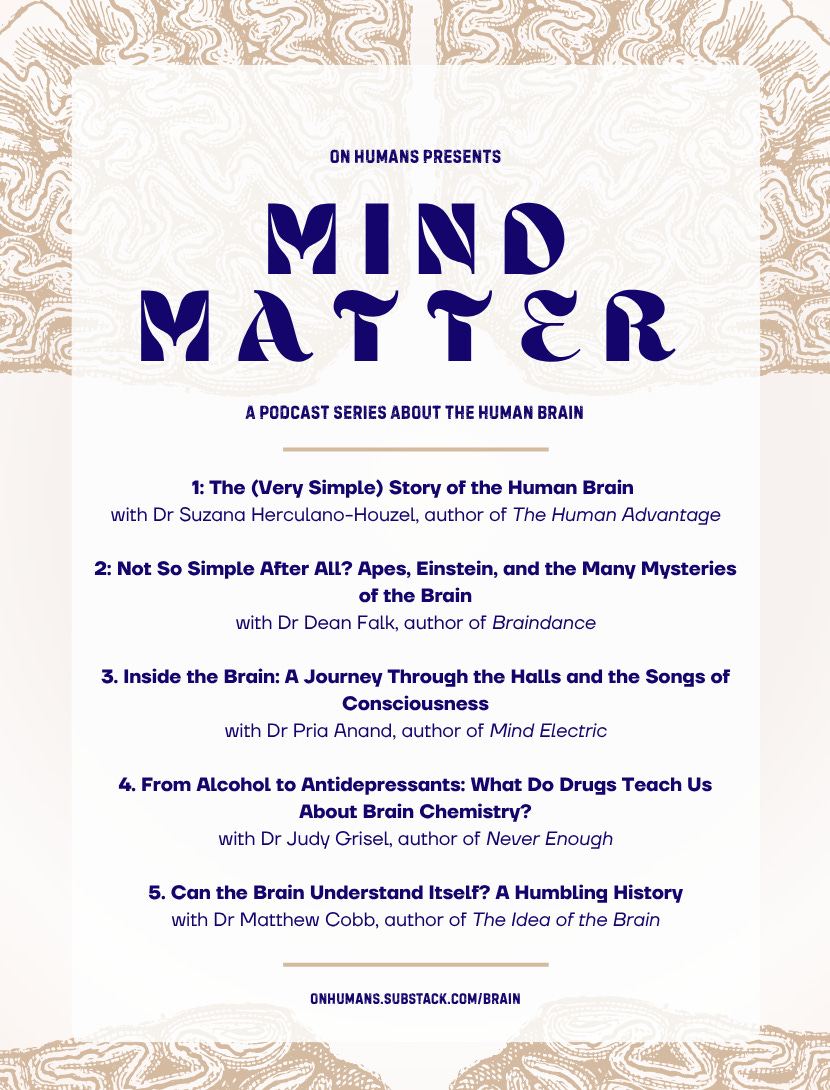Can the Brain Understand Itself?
Scientist and historian Matthew Cobb explores the limits of neuroscience.
Listen (1h): Spotify | Apple Podcasts | YouTube audio | Other players
Science has learned much about the brain. But how well do we understand this organ of the mind? Are we close to cracking the neural code? Is a groundbreaking theory of consciousness just around the corner?
In the past four episodes, we’ve heard from some leading brain scientists about the remarkable progress in the field. From the evolution of intelligence to the brain chemistry of addiction, there’s plenty to learn from them.
But despite all the progress, we are surprisingly far from understanding the brain. Or so argues Matthew Cobb, a neuroscientist and historian.
Cobb is the author of The Idea of the Brain: A History. The book tells the story of neuroscience from the Greeks to the present day.
Cobb’s book is full of colourful stories about how we got to where we are. But more importantly, the story he tells is a humbling reminder of the limits of our understanding of the brain. Indeed, despite all our advances in neuroscience, we are not even close to “cracking the neural code”. As someone who spent his career trying to understand the maggot’s nose, Cobb told me that:
“I am not terribly interested in human consciousness because I don’t think it’s a doable problem.”
This is not just a repeated version of the “hard problem of consciousness”. The problem goes deeper: indeed, our lack of understanding is so deep, Cobb explains, that we cannot even understand simple neural systems like the lobster’s stomach. The anecdote is revealing: the lobster’s stomach has around 30 neurons, all of which can be modelled in a simulation. Yet the scientist in question, Dr Eve Marder, is still unable to predict exactly how two simple rhythms arise from these 30 humble cells.1 (The lesson for me? Don’t bet your immortality on uploading your brain’s 80 billion neurons to a computer simulation…)
This is not just a problem for those interested in explaining the brain. This is also tragic, Cobb argues, for those who struggle with mental illness.
“No pharmaceutical company is trying to solve the mental health crisis. They got very lucky very quickly with a handful of [psychiatric] drugs. But the mechanisms involved remain very unclear.”
The outcome? There hasn’t been anything new in decades. And “there won’t be”.2
Indeed, Cobb thinks the situation is even worse than with treatment-resistant antibiotics.
“With antibiotics, we can imagine all sorts of things ways to solve the problem with AI or so. I don’t think there is anything equivalent in that kind of speculative futurology of psychopharmacology.“
But is the problem really so deep? Do we really need to cure schizophrenia or explain the lobster’s stomach before we can explain consciousness? We discuss this and much more in the episode.
Enjoy! Or head here for more episodes on brain science.
Listen (1h): Spotify | Apple Podcasts | YouTube audio | Other players
Fact Checking
Contrary to the precise phrasing in the episode, a handful of new psychiatric drugs are entering the market. The general observation remains well-supported.3
If you spot an error in this or other episodes, please comment on this post.
Mentions
Names: Matthew Cobb | Galen | Aristotle | Andreas Vesalius | William Harvey | William Shakespeare | Queen Victoria | Karl Marx | Pierre Paul Broca | René Descartes | Eve Marder | David Marr | Francis Crick | Geoffrey Hinton | John Hopfield | Warren McCulloch | Walter Pitts | John von Neumann | Alan Turing | Kenneth Craik | Sir John Eccles | Elon Musk | Nicolaus Copernicus | Galileo Galilei
Terms and concepts: recurrent laryngeal nerve | phrenology | localization of function | strokes/aphasia | Broca’s area | plasticity | hemispheric lateralization | corpus callosum | split-brain | consciousness | anesthesia (halothane, etc.) | drugs & neuromodulators | SSRIs | serotonin | dopamine | psychedelics | lobster stomatogastric ganglion | three-body-problem | EEG “brainwaves” (gamma, theta, etc.) | David Marr’s levels | neural code | PDP / connectionism | backpropagation | LLMs (e.g. ChatGPT, DeepSeek) | biological plausibility vs engineering | von Neumann architecture | McCulloch–Pitts logical neurons | neural correlates of consciousness (NCC) | “Jennifer Aniston” cells | single-unit recording | connectomics | Human Brain Project | cochlear implants | BCI / robotic arm control | tetraplegia | problem of consciousness | enactive cognition
EDIT: I got some constructive criticism from the referencing on Reddit. The precise claim is somewhat difficult to assess from scientific publications, as they are built around new findings rather than the remaning unknowns. Therefore, I’m relying here on Cobb’s interpretation. He also references Charlotte Nassim’s book Lessons from the Lobster. Some of Marder’s groups articles which hint at the suggested ignorance include this and this.
For the general scepticism, see Paul and Potter (2024, Nature). For exceptions, see Esketamine (Spravato), approved 2019 for treatment-resistant depression; Zuranolone (Zurzuvae) approved Aug 2023 as the first oral for Post Partum Depression; and Cobenfy/KarXT (xanomeline–trospium), approved Sept 2024 as the first non-dopaminergic antipsychotic drug against schizophrenia.
See above



